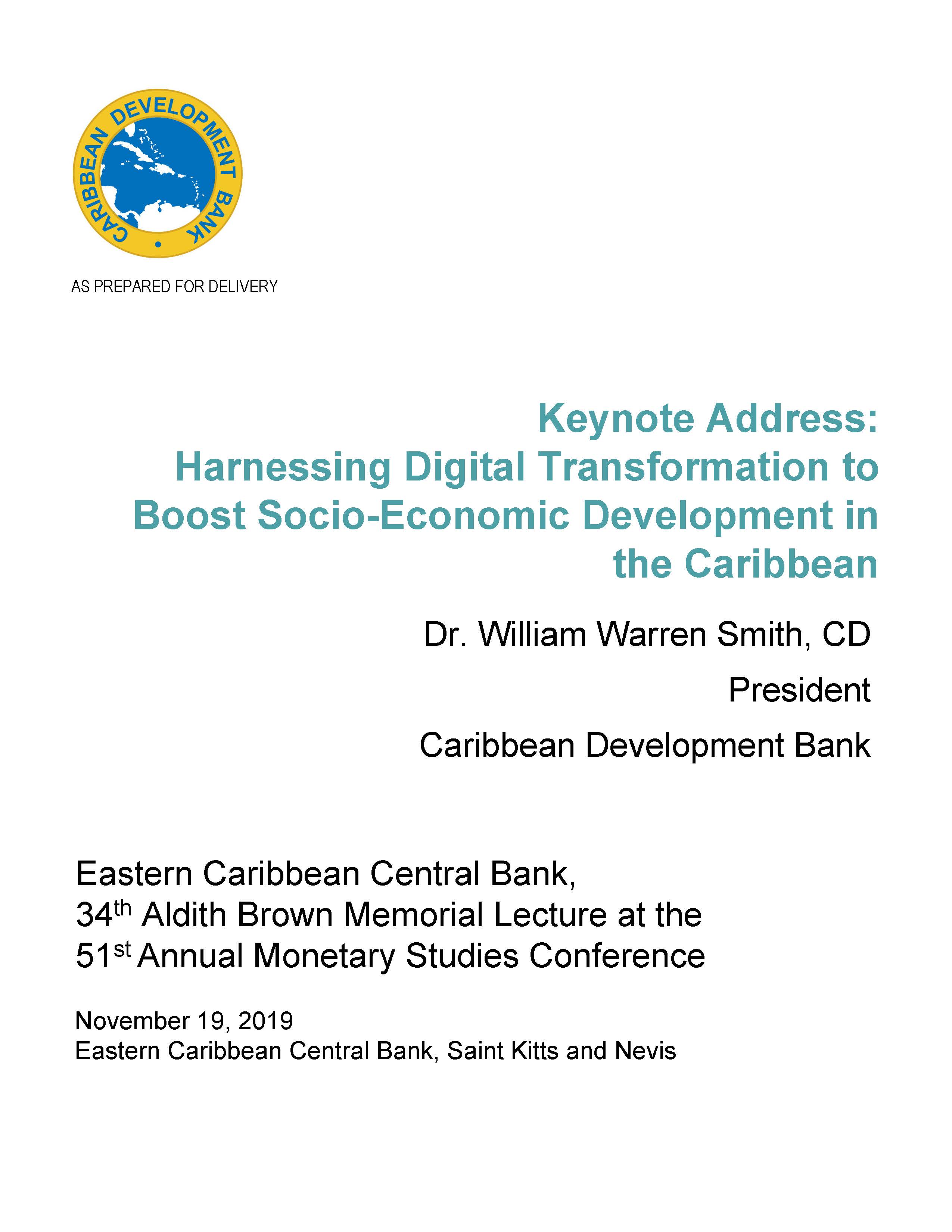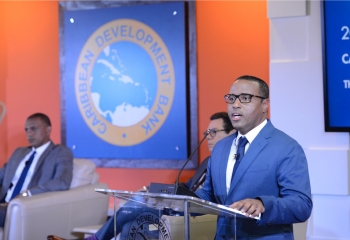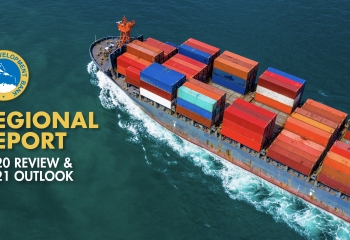Harnessing Digital Transformation to Boost Socio-Economic Development in the Caribbean
Saint Kitts and Nevis

Introduction
I feel a real sense of pride to have been asked to deliver the prestigious Adlith Brown Memorial Lecture at this 51st Caribbean Monetary Studies Conference, being hosted by the Eastern Caribbean Central Bank (ECCB). To my friend and colleague, Governor Timothy Antoine, I say a special thank you!
And while I did not have the pleasure of meeting Dr. Adlith Brown in person, I can feel her presence in our midst. Some of you here tonight would have attended the University of the West Indies, Mona Campus, and were schooled in international economics under her tutelage
A petite woman, Dr. Brown stood tall amongst her students and her peers, who she imbued with her passion for this Region and the promise of regional integration leading to improvements in the socio-economic circumstance of Caribbean citizens.
I feel truly honoured to be part of her legacy that lives on through this annual event.
The Fourth Industrial Revolution and the Sustainable Development Agenda
In keeping with the theme of the Conference, “Socio-Economic Transformation in the Caribbean: Policy Implications of the Fourth Industrial Revolution”, I propose to share with you my perspective on how our Region can harness digital transformation to boost socio-economic development in the Caribbean.
Indeed, digital transformation, which is simply another term for the Fourth Industrial Revolution, is forcing a shift in business operations, systems and processes, and expanding the possibilities for improvements in output, productivity, efficiency and export competitiveness.
Our world has begun to embrace the Fourth Industrial Revolution, which is moving at unprecedented and unrelenting speed. Its impact is far-reaching, stretching across government, industry and households. And it is driving tectonic changes in our labour markets, consumerism, and the general provision of goods and services.
A more connected and integrated global market is enabling the transfusion of modern technologies throughout our Region. These technologies are turning up in some of the most rural and remote areas and, in the process, leveling the playing field by removing geographical and other physical barriers to access.
Before I examine more closely the promise for rapid and sustainable socio-economic development being enabled by digital transformation, let me try to set the stage by reminding us of the current focus on socio- economic development for the Caribbean.
In 2015, our Region signed on to the United Nations’ 2030 Agenda for Sustainable Development. Our leaders committed to this global blueprint to end poverty, to fight inequality and to tackle climate change, while ensuring that no one is left behind!
Seventeen Sustainable Development Goals (SDGs) were adopted, all to be reached by 2030. Goal # 9, in particular, speaks to the role of innovative sustainable technologies, and equal and universal access to information to realise the prosperity envisaged.
Basically, world leaders were echoing Nelson Mandela who said in 2009 at ITU Telecom World in Geneva:
"Communication technologies have transformed the way people live and the manner in which countries develop. They have the potential to enable us to solve many of the critical problems confronting us. If this potential is to be realised, then we must find ways of turning these technologies into a resource for all people….."
As we prepare to enter the final decade of the 2030 Sustainable Development Agenda, it is imperative that we, in the Caribbean, give priority to embracing the technological innovations of the Fourth Industrial Revolution in order to address our most pressing development challenges.
Developed countries and leading businesses around the world are already pursuing their transformation agenda, and are putting appropriate policies and strategies in place. Our Region must similarly take a proactive stance and accelerate implementation of strategies which can position us to benefit from the opportunities of the Fourth Industrial Revolution.
In this way, we can safeguard our Region’s future by enabling everyone to participate fully in this shared prosperity, and finally end poverty in all of its forms.
In essence, I see in 2030, a Caribbean that is maximising the benefits of technology to:
- improve people’s well–being by creating greater access to decent jobs through increased investments in education, innovation and youth engagement in technology;
- create a climate-smart Region that is powered by renewable energy and is resilient to the impacts of climate change; and
- provide adequate protection for the vulnerable and disadvantaged groups in society.
We will know we have reached our destination when we can look back and proudly say “no one is left behind!”
But before we can devise an appropriate plan to make digital technology an integral part of our development agenda, we need to do some stock-taking.
So where does the Caribbean stand in this revolution?
If I were to choose one word that best describes our Region’s readiness to capitalise on the use of digital technologies for development, I would have to say “mixed”.
On the upside, significant strides have been made over the last two decades, in three components of our digital eco-system - infrastructure and technologies; policies and regulation; and human capacity and skills.
Information and communication technologies (ICTs) are more accessible and affordable than ever. Improvements in ICT infrastructure have resulted from increased market liberalisation and competition. And there have been policy and regulatory reforms which facilitated greater market participation by actors in this space.
Additionally, much of today’s workforce has basic computer literacy; but not enough to usher in an effective, large-scale digital transformation of Caribbean economies.
Ongoing investments in ICT infrastructure have contributed to wider geographical access to and overall improvements in ICT services and quality. Network speeds have risen; and several countries have moved from 3G to 4G networks.
Falling ICT service costs have improved affordability and contributed to increased adoption and use of the technology. For all, with the exception of Haiti, the cost of both fixed and mobile broadband is below the average cost globally and in The Americas.
Many Caribbean countries are close to achieving a global development target of having basic broadband services at less than 2% of monthly gross national income per capita.
Penetration rates, particularly for mobile telephone and broadband have improved appreciably. Excluding Haiti, the share of individuals using the internet in our Region rose from 27% to 53% between 2008 and 2016. The average mobile cellular penetration rate is over 110%.
Yes, in many countries, mobile subscriptions exceed the population size! And in the vast majority of Caribbean countries, more than half of the population has an active mobile internet subscription.
On the downside, most of these countries fall into the lower quadrant or beginner stage of digital maturity, and lag behind on all foundational elements of the digital economy. And our Region is still light years away from deploying the latest generation networks and infrastructure.
Regulatory frameworks are also unevenly developed. The legal frameworks in several countries do not explicitly regulate and protect data on digital platforms; nor do they address cybersecurity or e-commerce.
Pre-requisites for Digital Readiness
So, given our journey to date, where should we now concentrate our efforts in order to realise the possibilities of this Fourth Industrial Revolution and, in turn, to deliver for our people the promise of the Sustainable Development Agenda?
If we are to eliminate poverty by 2030, the next eleven years will have to be characterised by economic growth rates that significantly exceed the less than 1% of the past decade.
This growth will also have to be underpinned by:
- a greater skew towards higher value-added outputs and sectors that are net foreign exchange earners; and
- a modernised, slimmed-down, efficient and customer-focussed public sector.
How do we get to this new economy?
I would argue that there are at least three pre-requisites for making the Caribbean Fourth Industrial Revolution ready and capable of taking full advantage of the opportunities to advance socioeconomic development and prosperity.
The first pre-requisite is that Government policy and regulatory frameworks must foster agility, innovation and value creation.
Rapid changes in technology are requiring policymakers to accelerate implementation of regulatory and legislative reforms and business processes. Speed and flexibility must become defining characteristics of public service delivery.
These are prominent features in Estonia where the internet is recognised as a human right and the e-Government platform allows citizens to access 99% of government services online 24 hours a day.
The model from Estonia is built on key elements such as a secure digital identity, e-payments, voting and access to health care.
Annual savings, through significant time and cost reduction, amount to 2% of GDP.
The regulatory framework must also protect consumers and investors; encourage healthy competition; and guard against data piracy and other cyber-security risks.
Countries, like Barbados, have opted to create sandboxes to mitigate regulatory uncertainty by providing a controlled environment where companies can test their services under the supervision of the regulator.
The second pre-requisite is the acquisition of the digital skills and literacy necessary for Caribbean public servants, business professionals and citizens to thrive in this new era.
The average citizen must be able to use technologies for learning, for working and for participating in society in a responsible, safe, and confidential manner.
As such, policymakers will need to prioritise the development of skills, including critical thinking, problem solving, and creativity that are required for twenty-first century jobs.
Without this prioritisation, we risk falling behind as the proliferation of artificial intelligence, cloud computing, automation and other technologies render repetitive, routine, mechanical and time-consuming tasks redundant.
The 2018 Future of Jobs Report concluded that by 2022, 48% of industrial activity will be performed by machines, up from the current 29%.
On the other hand, a World Bank 2018 study estimated that by 2030, 65% of current primary school students will be engaged in jobs which presently do not exist. These findings point to an urgent need for an education strategy focused on training and retraining of the labour force to meet new job market requirements.
We need a radical change in our education system. We must change what, how, and when people learn. The 2019 World Economic Forum predicts that jobs that will be in high demand include data analysts, scientists, artificial and machine learning specialists, big data specialists, innovation professionals, e-commerce and social media experts, and robotics and software engineers.
These jobs will generally require an education with a high science, technology, engineering and mathematics (STEM) content, an area with traditionally low enrolment in the Caribbean. Strategic reforms are required to bring about radical shifts in human resource development and training. Policymakers, educators and the private sector must forge alliances to secure a match between labour market needs, curriculum development, training, and skills availability.
Now to my third pre-requisite, which is investment in digital infrastructure as the catalyst for accelerated economic growth and job creation.
Research conducted by the Organisation for Economic Co-operation and Development and the International Telecommunication Union found that:
- a 10% increase in broadband penetration raises per capita GDP by 1.0 - 1.5 percentage points; and
- on average, the employment multiplier for broadband investment in directly created jobs was 1.5, and 2.7 for indirectly created and induced new jobs.
Research by the Inter-American Development Bank also found that, a 10% increase in investment in digital infrastructure (especially telecommunications) in Latin America and the Caribbean can lead to a 2 - 3% increase in economic growth and a 2.6% increase in productivity.
There appears to be little doubt then, that the digital revolution, through its impact on economic growth and new job creation, must take centre stage in our quest to achieve the SDGs.
Caribbean MSMEs play a crucial role in economic growth and job creation, accounting for more than 50% of enterprises and over 50% of GDP. These small businesses are a critical medium for taking persons out of poverty and increasing the opportunities for our most at-risk populations. The concern, though, is that our MSMEs are slow to adopt new technologies and digital platforms.
If we can forge a marriage between our MSMEs and technology to create a new class of digital entrepreneurs, we can vastly expand the potential of this group to lower transaction costs; break through geographic barriers; and expand access to new markets and consumers.
For this to manifest itself, policymakers with the support of their development partners, must create a business environment that promotes start-up and entrepreneurial cultures; harmonisation of legal frameworks and standards; broadening of internet access; and the emergence of an affordable financial and e-payment infrastructure.
Digital financial services are not only necessary for digital entrepreneurship and MSME growth, but also present innovative opportunities to improve financial inclusion in the Caribbean. Only 19% of adults in our Region have accessed credit from a financial institution or have used a credit card. There is an over-reliance on cash, with 80% of transactions in the Eastern Caribbean Currency Union being cash-based. Usage is low even when customers are issued with debit cards, and ranges from 4% in Haiti to 38% in Trinidad and Tobago,
Financial technologies (Fintech) have improved access to financial accounts and are driving gains in productivity and investment.
In Haiti, where 80% of the adult population do not have bank accounts, mobile technologies have improved access to finance and other services by ordinary households.
MonCash, a mobile phone-based digital wallet, has been leveraged by households, and rural farmers, among others, to increase access to financial services in Haiti. An estimated 14% of the population now own these accounts; and 38% of adults receive or send domestic remittances through their mobile phones.
Fintech also has the potential to improve efficiency and reduce the cost of cross border transfers. Additionally, the ECCB and the Central Bank of The Bahamas are piloting the Caribbean’s first digital currencies.
Building Resilience
Before I close, I want to touch briefly on the topic of “building resilience”. Digital technologies can facilitate and strengthen resilience in areas which are broader than just climate change. These include economic resilience; access to education and health; infrastructure; environmental and disaster management; and post disaster recovery.
For the Caribbean, early warning and monitoring systems as well as post disaster recovery are critical. Hence, using the available technologies to adapt and respond to the increasing threats from climate change will be paramount to building resilience.
In Jamaica, for example, the Government has embarked upon an ambitious programme to upgrade its data centre and network with a view to improving business continuity and response to natural disasters. In building redundancies and planning for business continuity, digital technologies facilitate back-up and security of critical data, transactions, and assets.
The application of digital technologies to enable economic resilience is also slowly gaining momentum in the Caribbean. In the agriculture sector, digital ledger technology is being tested to provide greater levels of transparency and, open up new, high-value markets to small farmers in the Caribbean. In Trinidad and Tobago, for example, a pilot system using blockchain to trace the quality of cocoa is being explored. With blockchain technology a farmer can trace every transaction within the supply chain – from the moment the product leaves his farm until it is purchased. The benefits are significant and include reduced reliance on intermediaries, higher efficiency levels; reduction in waste; and improved food traceability and safety.
And in Barbados, fish farmers are using 3-D printing to make feeding devices and other prototypes. In this instance, technology is enabling the operation to become more sustainable through water and electricity conservation; and more compliant with regulation and standards. In addition the technology is being for water quality testing, and preparing feeding charts.
Conclusion
I have just outlined three pre-requisites for the Caribbean to participate fully and effectively in the digital revolution and to use it to reach the Sustainable Development Goals.
There is opportunity. Tim Fargo, author, angel investor and entrepreneur advised:
“Opportunity doesn't make appointments, you have to be ready when it arrives”.
If we embrace this opportunity, it can leapfrog our Region to the realisation of the promised sustainable development and shared prosperity, with no one being left behind.
Thank you.





